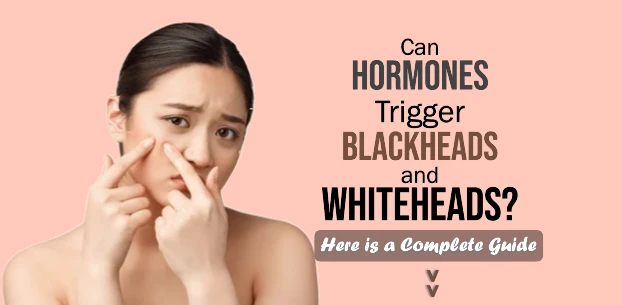Can Hormones Trigger Blackheads and Whiteheads? Understanding the Link Between Hormonal Changes and Acne
Can Hormones Trigger Blackheads and Whiteheads? Understanding the Link Between Hormonal Changes and Acne
Blackheads and whiteheads are common skin concerns that many people face at different stages of life. While factors like skincare habits, diet, and environment play a role, hormones often have a significant impact—especially when breakouts appear suddenly or worsen during certain times. But how exactly do hormonal changes trigger blackheads and whiteheads? Let’s explore.
What Are Blackheads and Whiteheads?
Blackheads (open comedones) and whiteheads (closed comedones) are types of non-inflammatory acne. They form when excess sebum (oil), dead skin cells, and sometimes bacteria clog the pores.
In blackheads, the clogged pore stays open, and the trapped material oxidizes when exposed to air, turning dark. In whiteheads, the pore remains closed under a thin layer of skin, creating a small, flesh-colored bump.
How Hormones Influence Acne
Hormones—especially androgens like testosterone—play a powerful role in regulating oil production in the skin. When androgen levels rise, they stimulate sebaceous (oil) glands to produce more sebum. This excess oil mixes with dead skin cells, leading to clogged pores, which can turn into blackheads and whiteheads.
Hormonal fluctuations aren’t limited to teenagers. Adults can experience hormone-related breakouts due to:
-
Puberty: Increased androgen production often causes oilier skin and the first signs of blackheads and whiteheads.
-
Menstrual cycle: Many women notice more breakouts about a week before their period when hormone levels fluctuate.
-
Pregnancy: Hormonal shifts can either improve or worsen acne.
-
Polycystic Ovary Syndrome (PCOS): Elevated androgen levels often lead to persistent blackheads and whiteheads.
-
Stress: While stress itself doesn’t directly cause acne, it can trigger the release of cortisol, which can increase oil production.
Why Some People Get More Blackheads and Whiteheads
Not everyone reacts to hormonal changes the same way. Genetics, skin type, and lifestyle can influence how your skin responds. For example, if your skin naturally produces more oil or sheds dead skin cells unevenly, you may be more prone to clogged pores during hormonal changes.
Managing Hormonal Blackheads and Whiteheads
While you can’t always control your hormones, you can manage how they affect your skin:
-
Gentle cleansing: Use a mild cleanser twice daily to remove excess oil and impurities.
-
Exfoliation: Regular exfoliation (using chemical exfoliants like salicylic acid) helps keep pores clear.
-
Oil control: Look for non-comedogenic skincare and makeup products to avoid adding extra oil to your skin.
-
Targeted treatments: Products containing retinoids, benzoyl peroxide, or niacinamide can help reduce clogged pores.
-
Lifestyle factors: Managing stress, eating a balanced diet, and getting enough sleep may help keep hormones (and your skin) more balanced.
When to See a Dermatologist
If blackheads and whiteheads persist or worsen despite good skincare habits, it might be time to consult a dermatologist. For hormone-related acne, medical treatments like topical retinoids, oral contraceptives (for women), or anti-androgen medications can help regulate oil production and reduce breakouts.
Final Thoughts
Hormones can indeed trigger blackheads and whiteheads by increasing oil production and making pores more likely to clog. Understanding this connection can help you choose the right skincare routine and, if needed, seek professional help. Clearer, healthier skin is achievable with the right approach tailored to your unique hormonal and skin needs.

Related Blog
What Causes Oily Skin and Can It Be Managed Naturally? Exploring Root Causes and Gentle Solutions
Aug 2, 2025 by Admin
General
What Are the Signs That You Have Sensitive Skin? Key Symptoms to Help You Identify This Delicate Skin Type
Aug 1, 2025 by Admin
General